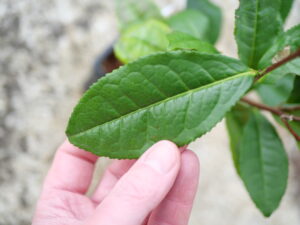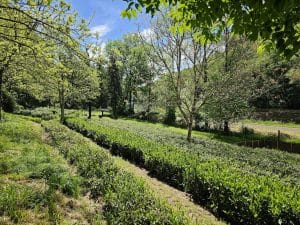
Chinese Cultivars Suitable for Green Tea Production
Green tea, the primary type of tea produced in China, mainly comes from the region surrounding the Yangtze River. Its base ingredient is the same plant, Camellia sinensis, as other
The origins of filleule des fées
A unique tea born from a shared passion
The history of Breton tea is rooted in the picturesque Blavet Valley, which offers an ideal terroir for growing tea. Follow the bold adventure of Weizi and Denis Mazerolle, who planted the first tea bushes in 2006, launching an exciting and innovative project.
In 2006, Weizi and Denis Mazerolle planted 10 tea bushes in the heart of the Blavet valley. Half of the young plants were the delight of deer, while the other half survived and continued to grow without any particular care. Over the years, the survivors grow into magnificent shrubs.
8 years later, when the tea bushes are strong enough, it is possible to pluck a few leaves to make tea. The green tea produced has a rich and seductive range of aromas, linked to the terroir and the ‘semi-wild’ growing conditions.
The first tea bushes to be planted are now on display in our tea garden at Trébihan, on the banks of the River Blavet.
Since 2016, every year between April and July, we pick young leaves to test different methods and parameters for processing the leaves into green, white, black and even blue (oolong) tea.
Our small-scale facility makes it easy for us to carry out comparative analyses to determine which cultivars produce the best teas.
As of 2018, no fewer than 2,000 tea bushes grown from our own cuttings are being planted. Of course, these cuttings were taken from the tea bushes that gave us the most interesting teas.
In 2019, there’s a change of scale! The tea garden now has almost 13,000 plants of various origins, some from seeds and some from cuttings. To give them more space, we’re looking for new plots to develop the plantations, still in the Vallée du Blavet.
Since 2020, we’ve been selling our tea, harvested, processed and packaged in the Blavet Valley! Initially available only in green and black tea, we can now also offer blue and white tea.
Today, our team of craftsmen is continuing its research to identify the best cultivars that will lead to the production of exceptional French teas.
our philosophy
The tea plants are carefully selected. They come from seeds of European origin or from cuttings grown in nurseries to preserve the genetic heritage and qualities of each cultivar.
The chosen varieties are then planted in Brittany, where the climatic conditions are ideal for tea camellias.
Our tea plantations are managed with a commitment to ecology, using methods that respect the environment. Our tea bushes are irrigated using reclaimed water systems, minimising our water footprint.
This sustainable approach contributes to the preservation of local ecosystems.
We pick by hand, carefully selecting the bud and one or two leaves, so as not to exhaust the shrubs.
By favouring gentle, respectful harvesting techniques, we preserve the sustainability of our crops.
We collaborate and participate in efforts to develop the tea sector in France and Europe, by adopting an ecologically and economically sustainable model.
This approach aims to improve our growing practices and share innovations that promote environmental responsibility.

Green tea, the primary type of tea produced in China, mainly comes from the region surrounding the Yangtze River. Its base ingredient is the same plant, Camellia sinensis, as other

Since 2006, in the heart of the Blavet Valley in Morbihan, Filleule des Fées has been growing premium organic tea from its own plantations. Initially, the tea plantation consisted of